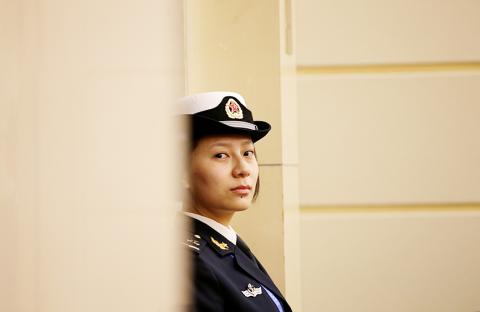China is to show off new warships, including nuclear submarines and destroyers, at a parade on Tuesday marking 70 years since its navy’s founding, a senior commander said yesterday, as Beijing flexes its increasingly well-equipped military muscle.
Chinese President Xi Jinping (習近平) is overseeing a sweeping plan to refurbish China’s military by developing everything from stealth jets to aircraft carriers as China ramps up its presence in the South China Sea and around Taiwan.
The Chinese People’s Liberation Army Navy (PLAN) has been a key beneficiary of the modernization plan, as China looks to project power far from the country’s shores, and protect its trading routes and citizens overseas.

Photo: Reuters
Beijing last month unveiled a target of a 7.5 percent rise in defense spending for this year, a slower rate than last year, but still outpacing China’s economic growth target.
PLAN Vice Admiral Qiu Yanpeng (邱延鵬) told reporters in the eastern city of Qingdao that Tuesday’s naval parade — likely to be overseen by Xi himself, although China has not confirmed that — would feature 32 vessels and 39 warplanes.
“The PLAN ships and aircraft to be revealed are the Liaoning aircraft carrier, new types of nuclear submarines, new types of destroyers, as well as fighter aircraft,” Qiu said, without giving details. “Some ships will be revealed for the first time.”
It is not clear if China’s second carrier, an as-yet unnamed ship developed and built purely in China, is also to take part, but in the past few days, state media have run stories praising recent sea trials.
About a dozen foreign navies are also taking part. While Qiu did not give an exact number, China has announced the parade would include ships from Russia, Singapore, India, Thailand and Vietnam.
Vietnam frequently complains of Chinese military activity in the disputed South China Sea, where Taiwan also has claims.
China’s last naval battles were with the Vietnamese in the South China Sea, in 1974 and 1988, although these were relatively minor skirmishes.
Qiu reiterated China’s frequent stance that its armed forces are not a threat to anyone.
“It is fair to say that the PLAN has not brought war or turbulence to any place,” but China has been scarred by its past and needs good defenses, Qiu said.
“A strong navy is essential for building a strong maritime country,” Qiu said. “From 1840 to 1949, China was invaded by foreign powers from the sea more than 470 times, which caused untold suffering and deep wounds to the Chinese nation.”

INVESTIGATION: The case is the latest instance of a DPP figure being implicated in an espionage network accused of allegedly leaking information to Chinese intelligence Democratic Progressive Party (DPP) member Ho Jen-chieh (何仁傑) was detained and held incommunicado yesterday on suspicion of spying for China during his tenure as assistant to then-minister of foreign affairs Joseph Wu (吳釗燮). The Taipei District Prosecutors’ Office said Ho was implicated during its investigation into alleged spying activities by former Presidential Office consultant Wu Shang-yu (吳尚雨). Prosecutors said there is reason to believe Ho breached the National Security Act (國家安全法) by leaking classified Ministry of Foreign Affairs information to Chinese intelligence. Following interrogation, prosecutors petitioned the Taipei District Court to detain Ho, citing concerns over potential collusion or tampering of evidence. The

Seventy percent of middle and elementary schools now conduct English classes entirely in English, the Ministry of Education said, as it encourages schools nationwide to adopt this practice Minister of Education (MOE) Cheng Ying-yao (鄭英耀) is scheduled to present a report on the government’s bilingual education policy to the Legislative Yuan’s Education and Culture Committee today. The report would outline strategies aimed at expanding access to education, reducing regional disparities and improving talent cultivation. Implementation of bilingual education policies has varied across local governments, occasionally drawing public criticism. For example, some schools have required teachers of non-English subjects to pass English proficiency

NEGOTIATIONS: The US response to the countermeasures and plans Taiwan presented has been positive, including boosting procurement and investment, the president said Taiwan is included in the first group for trade negotiations with the US, President William Lai (賴清德) said yesterday, as he seeks to shield Taiwanese exporters from a 32 percent tariff. In Washington, US Trade Representative Jamieson Greer said in an interview on Fox News on Thursday that he would speak to his Taiwanese and Israeli counterparts yesterday about tariffs after holding a long discussion with the Vietnamese earlier. US President Donald Trump on Wednesday postponed punishing levies on multiple trade partners, including Taiwan, for three months after trillions of US dollars were wiped off global markets. He has maintained a 10 percent

TRADE: The premier pledged safeguards on ‘Made in Taiwan’ labeling, anti-dumping measures and stricter export controls to strengthen its position in trade talks Products labeled “made in Taiwan” must be genuinely made in Taiwan, Premier Cho Jung-tai (卓榮泰) said yesterday, vowing to enforce strict safeguards against “origin laundering” and initiate anti-dumping investigations to prevent China dumping its products in Taiwan. Cho made the remarks in a discussion session with representatives from industries in Kaohsiung. In response to the US government’s recent announcement of “reciprocal” tariffs on its trading partners, President William Lai (賴清德) and Cho last week began a series of consultations with industry leaders nationwide to gather feedback and address concerns. Taiwanese and US officials held a videoconference on Friday evening to discuss the